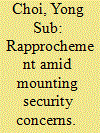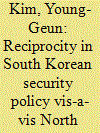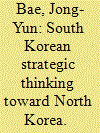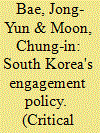|
|
|
Sort Order |
|
|
|
Items / Page
|
|
|
|
|
|
|
| Srl | Item |
| 1 |
ID:
166010


|
|
|
|
|
| Summary/Abstract |
The 1998–2007 inter–Korean reconciliation was paradoxical because there were aggravating military tensions during the same period. To solve the security puzzle, this paper employs a Gramscian approach and argues that the reconciliation was pursued as hegemonic projects by the ruling political groups in North and South Korea. In South Korea, the economic crisis in 1997 led counter-hegemonic liberal nationalists to take political power, and the new ruling political group implemented the engagement policy toward Pyongyang to attain hegemony. In North Korea, the existing ruling political group sought to reconcile with Seoul, mostly for material gains to maintain hegemony by stopping the ongoing economic crisis from developing into a political crisis without a full–scale reform of the system. In the process, each capitalized on unication nationalism, which had a strong national– popular force because of the division of Korea. The rapprochement was carried out primarily to exhibit their contributions to unication, which could be signicantly conducive to their winning the domestic struggle for hegemony.
|
|
|
|
|
|
|
|
|
|
|
|
|
|
|
|
| 2 |
ID:
121734


|
|
|
|
|
| Publication |
2013.
|
| Summary/Abstract |
I review the principle of reciprocity in South Korean security policy with regard to North Korea and the United States and analyze how the principle fits with US security policy concerning South Korea. Diffuse reciprocity shaped Korean security policy starting with President Kim Dae-jung's Sunshine Policy. The Lee Myung-bak government's hard-line approach increased military tension and economic anxiety on the peninsula. The new South Korean government under Park Geun-hye should devise achievable policy measures rather than place excessive pressure or unrealistic demands on North Korea.
|
|
|
|
|
|
|
|
|
|
|
|
|
|
|
|
| 3 |
ID:
148942


|
|
|
|
|
| Summary/Abstract |
Since the end of the Cold War, there have been many ups and downs in U.S. relations with China. Each presidential administration—whether Democrat or Republican—has pursued a policy of “engagement.” Although this term, or policy frame, has meant many things, it represents for them a broad umbrella concept that includes a range of policy options mixing cooperative and competitive approaches. The Obama administration has been no exception. This paper explains the Obama administration's engagement policy by evaluating its two central elements: (1) the bilateral relationship with China itself and (2) the rise of a pan-Asian regional policy that undergirds its rebalance to Asia. In this analysis, the Obama administration's approach encompasses both cooperative and hedging strategies, thus demonstrating more continuity than change in its approach to China. It concludes by noting that, despite the growing competition in the U.S.–China relationship, strategic rivalry is not a preordained policy outcome. Rather, the common future for both states rests on leadership and smart policy choices, not fate.
|
|
|
|
|
|
|
|
|
|
|
|
|
|
|
|
| 4 |
ID:
096009


|
|
|
|
|
| Publication |
2010.
|
| Summary/Abstract |
Despite agreements in 2007 in the Six-Party Talks, the U.S. and South Korea have had trouble reaching consensus in dealing with subsequent nuclear crises spawned by North Korea. This study focuses on South Korean strategic thinking about and policy toward North Korea and Korean unification, and their changes since the 1990s.
|
|
|
|
|
|
|
|
|
|
|
|
|
|
|
|
| 5 |
ID:
127762


|
|
|
|
|
| Publication |
2014.
|
| Summary/Abstract |
During the progressive decade of the Kim Dae-jung and Roh Moo-hyun governments (1998-2007), South Korea actively pursued an engagement policy with North Korea that aimed to facilitate de facto unification by means of exchanges and cooperation, trust-building, and peaceful coexistence. But the engagement policy has been subject to harsh criticism for its silence over human rights conditions in North Korea. This article looks into the nature of conservative critiques of the engagement policy on the human rights front and elucidates how its proponents have responded. Attention is given to how the trade-off between peace and human rights, as well as that between basic human needs and human rights, constrained their open pursuit of a human rights campaign against North Korea. Also examined is their belief that democracy and human rights should not be imposed from the outside and that North Koreans should win them through struggle from within. For conservatives, hard-line pressures are of limited utility, and opening and reform, the introduction of market system, the expansion of civil society, and the advent of the middle class through the engagement policy are the best ways, albeit time consuming, to enhance human rights and democracy in the North. Finally, the authors critically assess recent debates on the North Korean Human Rights Act in the South Korea's National Assembly as a way of exploring the limits and promise of the engagement policy.
|
|
|
|
|
|
|
|
|
|
|
|
|
|
|
|
|
|
|
|
|